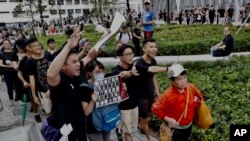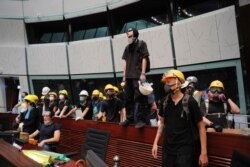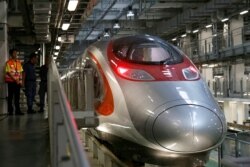Protesters in Hong Kong were taking their message to visitors from mainland China on Sunday in a march to a high-speed rail station that connects to Guangdong city and other mainland destinations.
A mostly young crowd gathered in the midafternoon ahead of a march through a high-end shopping area popular with Chinese tourists and ending at West Kowloon station.
Police put up large barricades blocking a main entrance to the station to prevent any attempt to enter it. Only passengers with train reservations would be allowed into the station, the mass transit authority said, and Hong Kong media reported that ticket sales had been suspended for afternoon trains.
Hong Kong has been riven by protests for the past month, sparked by proposed changes to extradition laws that would have allowed suspects to be sent to the mainland to face trial. Hong Kong leader Carrie Lam suspended the bill and apologized for how it was handled, but protesters want it to be formally withdrawn and for Lam to resign.
March organizers said they want to explain their cause to people from the mainland, where media coverage of the movement has been limited and focused largely on the damage to public property.
The march is the first major protest since last Monday, when protesters smashed thick glass walls to break into the legislature building and wreaked havoc inside, spray painting slogans on the walls, overturning furniture and damaging voting and fire prevention systems.
The proposed extradition legislation raised broader concerns about an erosion of freedoms and rights in the semi-autonomous Chinese territory in recent years.
Hong Kong was allowed to keep its own legal system for 50 years after Britain returned the then-colony to China in 1997, but many in the city fear that freedom of expression and other rights are under threat.
The high-speed rail station, which opened last September, was a source of contention, as passengers pass through Chinese immigration and customs inside. Some opposition lawmakers said the fact that Chinese law applies in the immigration area violates the agreement giving Hong Kong its own legal system.
The July 1 break-in at the legislature overshadowed a peaceful march the same day by hundreds of thousands of people also opposed to the extradition legislation.
Protesters also are demanding an independent investigation into a crackdown on demonstrations June 12 in which officers used tear gas and rubber bullets to disperse crowds blocking major city streets. The tactics used were harsher than usual for Hong Kong, which police have said were justified after some protesters turned violent. Dozens were injured in the clashes, both protesters and police.
The protesters are also calling for direct election of Hong Kong’s leader. Lam was chosen by an elite committee of mainly pro-Beijing electors.






